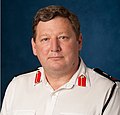| Commander of Strategic Command | |
|---|---|
| Ministry of Defence Strategic Command | |
| Type | Four-star officer |
| Status | Chief of Joint Forces |
| Member of | Defence Council Chiefs of Staff Committee |
| Reports to | Chief of the Defence Staff |
| Nominator | Secretary of State for Defence |
| Appointer | Prime Minister (subject to formal approval by the King-in-Council ) |
| Formation | April 2012 (as Commander, Joint Forces Command) December 2019 (as Commander, Strategic Command) |
| First holder | Air Chief Marshal Stuart Peach |
| Deputy | Deputy Commander UK Strategic Command |
Commander of Strategic Command is a high-ranking position in the British Armed Forces, usually held by a four-star officer. The commander is the head of Strategic Command, which manages allocated joint capabilities from the three armed services.





